Wide Shot: Hollywood promised antiracist action. We asked for a progress report
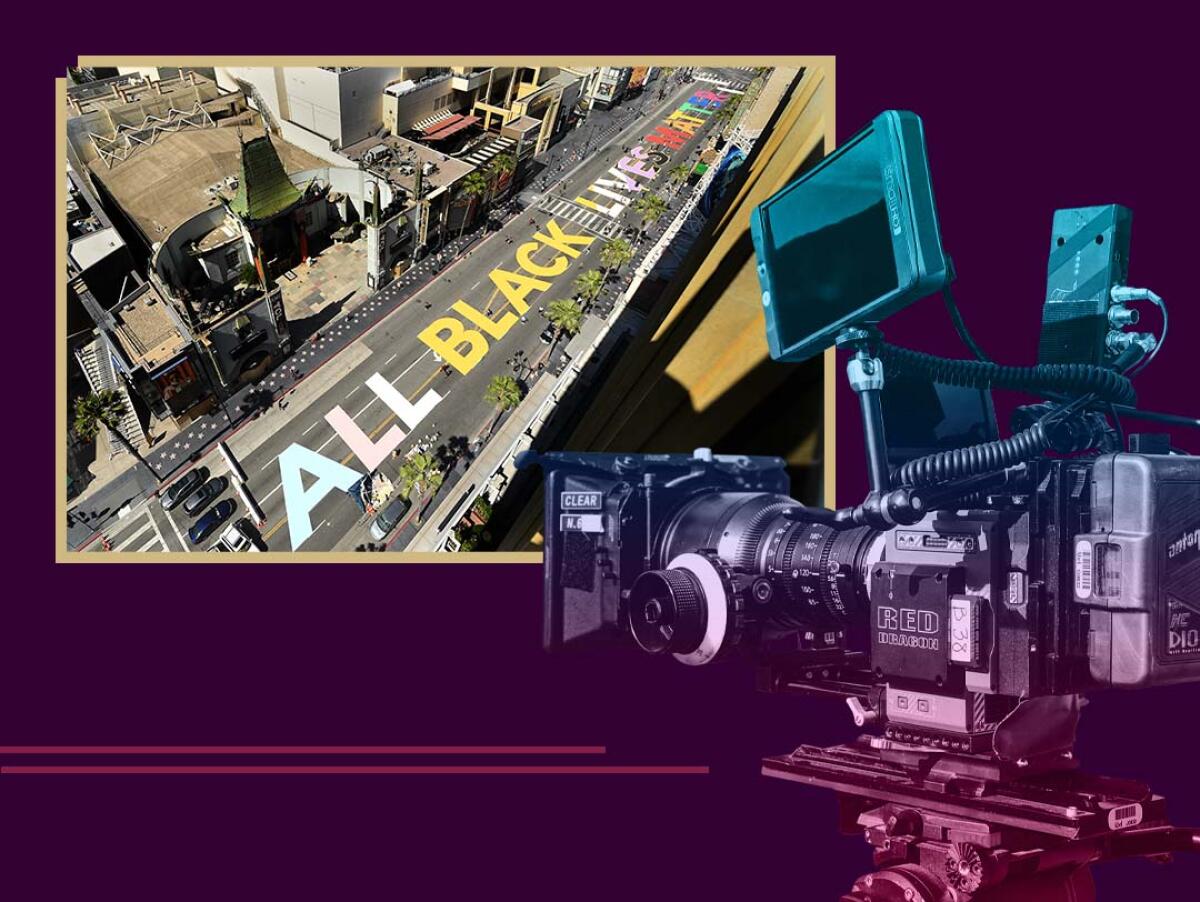
This is the Sept. 14, 2021, edition of The Wide Shot, a weekly newsletter about everything happening in the business of entertainment. Sign up here to get it in your inbox.
During the protests that followed the murder of George Floyd by Minneapolis police last year, Hollywood, which had long been criticized for its failings on diversity and inclusion, promised to do better.
The entertainment companies set up funds for social justice causes and responded to America’s racial reckoning with racially themed programming, antiracist education initiatives and pipeline programs to expand opportunities for creatives from underrepresented groups.
This outpouring was met with a certain amount of skepticism. How much change could be expected from an industry in which the executive suites were still dominated by white men?
A recent conversation with Codeblack founder Jeff Clanagan at the Canoga Park production facilities for Kevin Hart’s company, Laugh Out Loud, eventually turned to Hollywood’s promises of antiracism and whether the studios had lived up to their promises.
“You saw a lot of the big companies make these commitments, right?” Clanagan, who is Laugh Out Loud’s CEO, told me. “The reality is, you should do a report card. I saw the press releases. I haven’t seen the results of the commitments.”
The piece my colleague Greg Braxton and I published yesterday isn’t exactly the kind of report card Clanagan was talking about. But the goal was similar — to establish a way to keep tabs on the industry’s progress and whether the pledges of support are sincere or just for show.
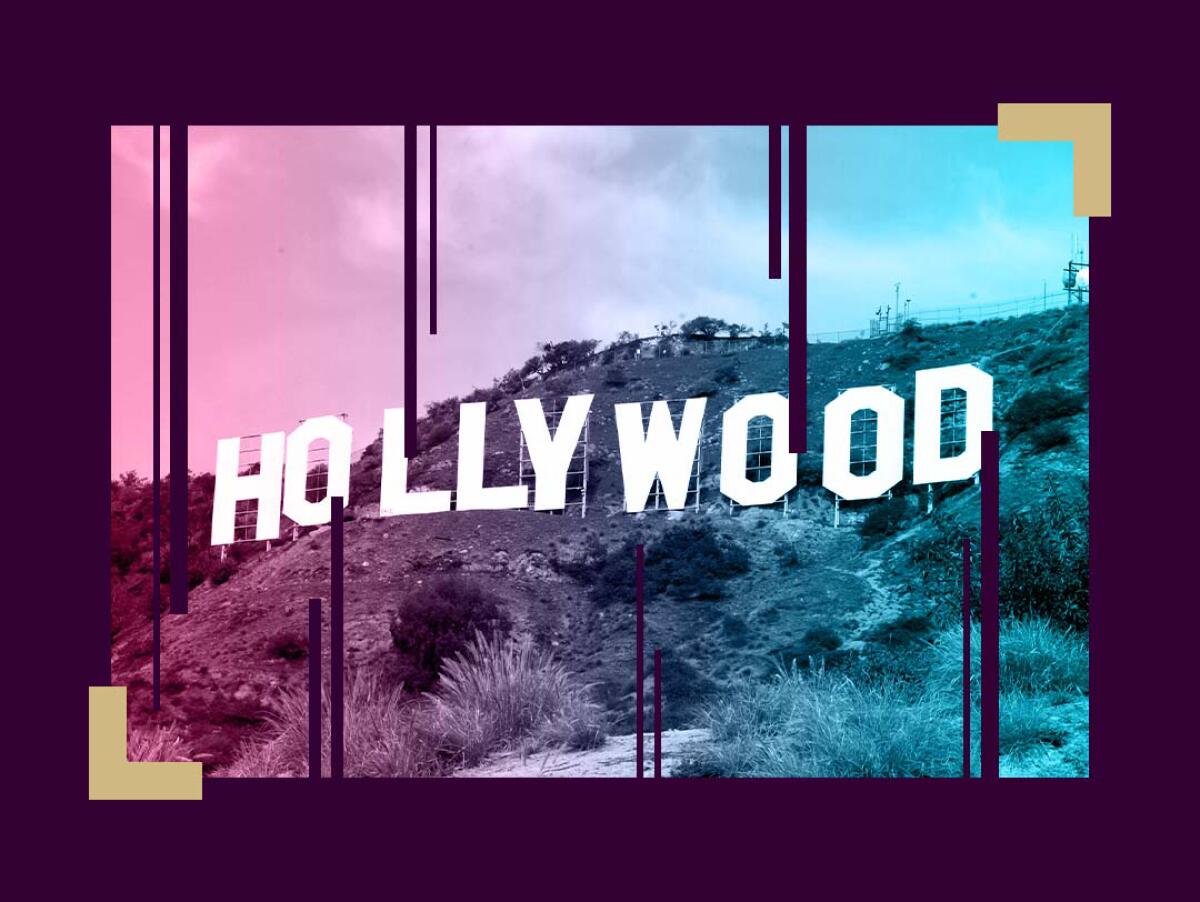
Studios say they remain committed. But it remains to be seen whether Hollywood’s actions will result in meaningful change for an industry with persistent barriers to entry for people without existing connections — or the ability to toil for years in low-paying assistant jobs and internships.
Inclusion gaps remain, especially behind the scenes, as we wrote. People of color accounted for 25% of the directors for 2020’s top films, according to data from UCLA’s Hollywood Diversity Report.
Though that was up significantly from the prior year, UCLA Dean of Social Sciences Darnell Hunt explained to me that the pandemic probably skewed the data. Many big-screen releases were delayed until 2021, and the smaller films that get released through streaming tend to be more diverse. In other words, let’s check back in next year.
We may have to wait even longer to truly evaluate shifts in the C-suites. UCLA’s 2020 report indicated that 91% of studio heads, 93% of senior executives and 86% of unit heads were white. Hunt said UCLA only studies the executive numbers every few years because “quite frankly, it doesn’t change.” That’s not a very hopeful message, but it underscores the issue.
As for all the well-intentioned screenwriting and directing programs out there, there’s widespread recognition that their effectiveness is limited. Just ask the people who run them.

Tim McNeal, a former development executive, serves as senior vice president of creative talent development & inclusion at Disney’s general entertainment group, the division responsible for TV programming on ABC, FX and other networks.
This year, in a major change from what had been essentially a shadowing program, his unit’s long-running directors program committed to having participants direct episodes of shows including “black-ish,” “Good Trouble” and “Snowfall.”
While such programs can benefit those applicants who get in, the bigger change has to come from broader efforts by studios to connect up-and-coming talent to established executives, McNeal said. McNeal’s unit also connects new writers and directors to Disney executives through “speed dating”-type events.
“For us, good intentions don’t mean much if people aren’t getting jobs,” McNeal said. “We want to support them not just in their first episode or second episode, but we want to make sure they get enough traction to become working directors not just at our company, but across all of episodic television.”
When I spoke to McNeal last week, he remarked on how much the cultural conversation around race in the business has changed over the years. “When I first started at Disney 15 years ago, at the mere mention of the word ‘diversity,’ people would scatter,” he said. It’s a lot harder to run away from those discussions now.
Stuff we wrote
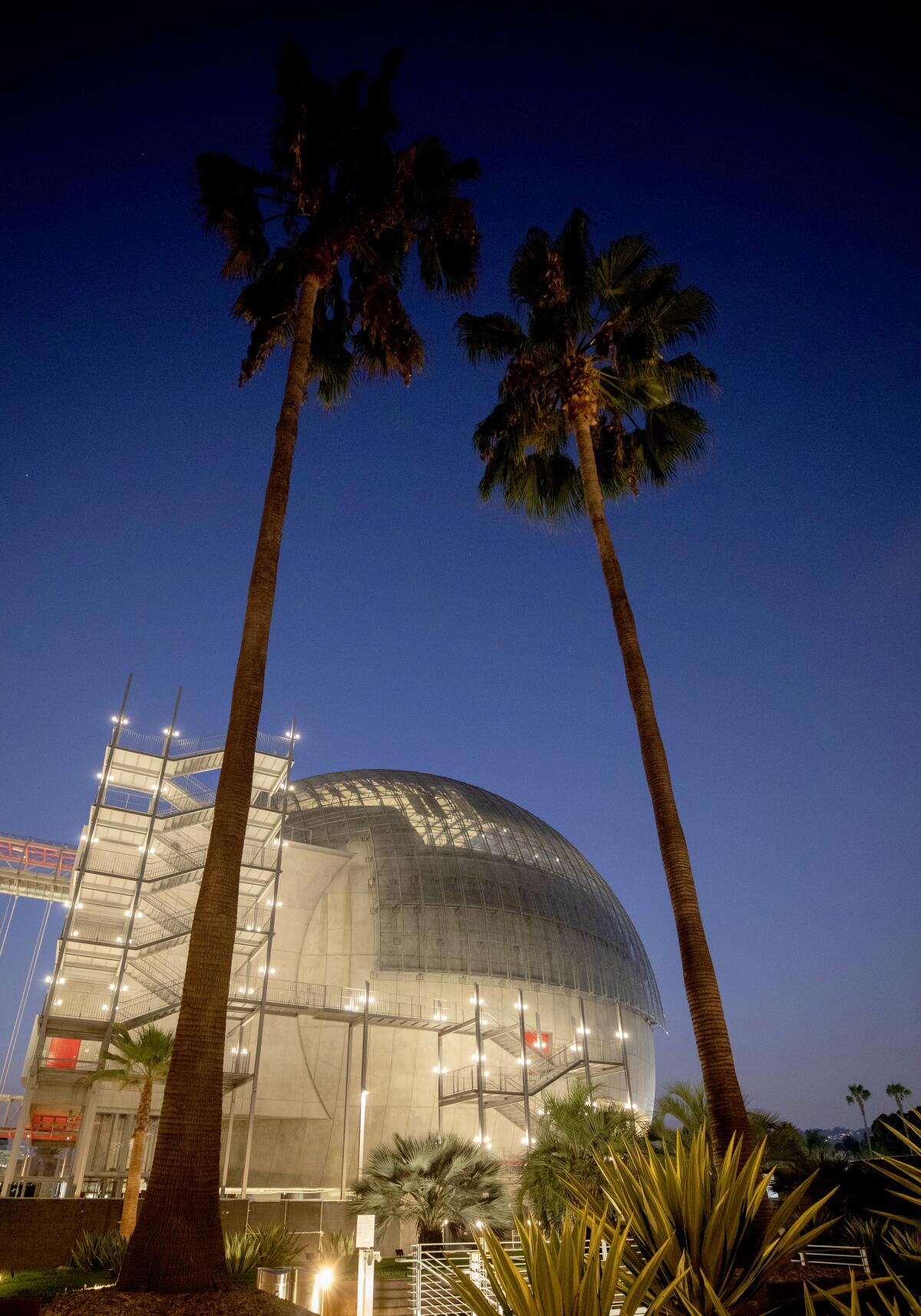
— How 9/11 changed the way we watch TV news. Stephen Battaglio reminds us of how we got the infamous cable news headline scroll...
— At 91, Clint Eastwood throws a punch and rides a horse in his new movie. And he’s not ready to quit, according to our former film critic and fellow non-quitter Kenneth Turan.
— The Academy Museum saga has all the hallmarks of an out-of-control Hollywood production. But now it’s finally here, and Josh Rottenberg went behind the scenes to tell us about the dramatic journey and what’s at risk.
— Fleetwood Mac fired Lindsey Buckingham. So why won’t he let them go? Must-read profile by Amy Kaufman.
— The latest from the Screen Gab newsletter: How Black contestants made ‘Big Brother’ history and why “Impeachment” isn’t streaming on Hulu.
— Last time, it involved the mob, riots and Warner Bros. Could crews strike again? Anousha Sakoui on the historical context of a possible IATSE work stoppage after months of protracted negotiations.
Speaking of below-the-line work, here’s the latest chart showing weekly shoot days in Greater Los Angeles.
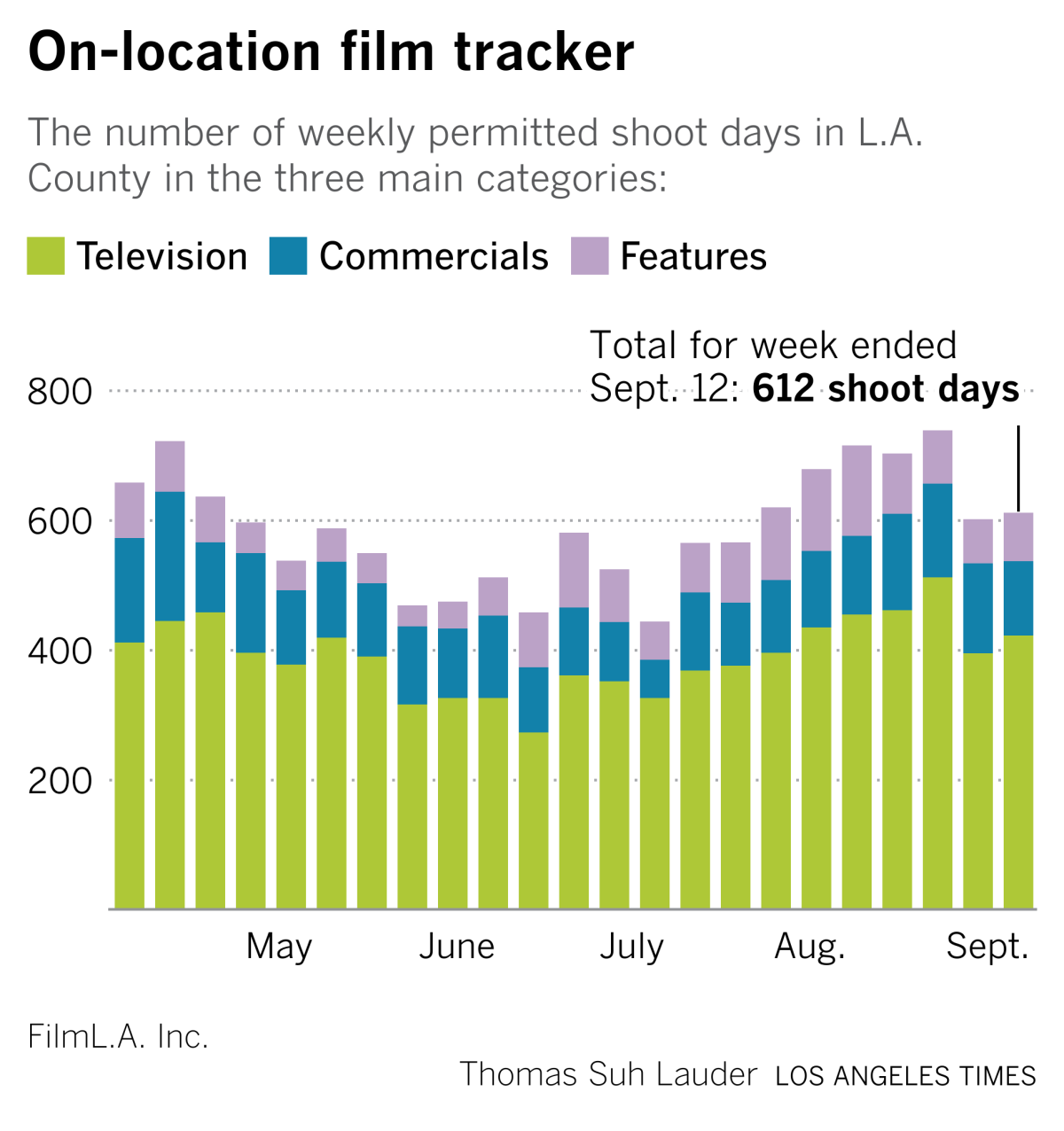
Number of the week

When you use Apple’s App Store to buy a new game, pay for a subscription or make an in-app purchase on your iPhone, the Cupertino tech giant takes a 15%-30% commission from that transaction.
Developers like “Fortnite” maker Epic Games would like to keep more of the money , and argue that Apple’s business practices are anticompetitive. Epic wants to be able to steer users to buy from it directly, which is something the App Store forbids.
A ruling by a U.S. federal judge gave Epic a partial victory in its legal battle against Apple last week. While U.S. District Judge Yvonne Gonzalez Rogers said that Apple is not a monopoly as Epic claimed, the Cupertino giant must allow app and game developers to direct users to their own payment systems.
This comes after Apple previously agreed to loosen its rules on app store payments. As part of a settlement of another legal fight, the company last month said it would let developers email their users about alternative ways to pay by going around the App Store commission system.
It’s still not clear how much of a blow this is for Apple, nor how much of a boon it will be for game makers and streaming services. Spotify, which has been waging a separate legal battle in the EU over Apple’s allegedly anticompetitive practices, cheered the judge’s ruling. Netflix doesn’t allow signups through Apple, so there’s not much impact there.
It’s a bigger deal for game makers than for the streamers. That’s because App Store purchases only account for a fraction of streaming subscriptions, analyst Doug Creutz of Cowen & Co. said via email. For game makers, the size of the effect is also not obvious. It may not be so easy to get “Fortnite” players to leave the convenience of the App Store in order to pay another company.
The decisions in no way spell the end of Apple’s 15%-30% commission, which generates billions of dollars. But it is an example of how app makers are eating away at some of the App Store’s long-established rules.
Scoring the week: streaming vs. theatrical
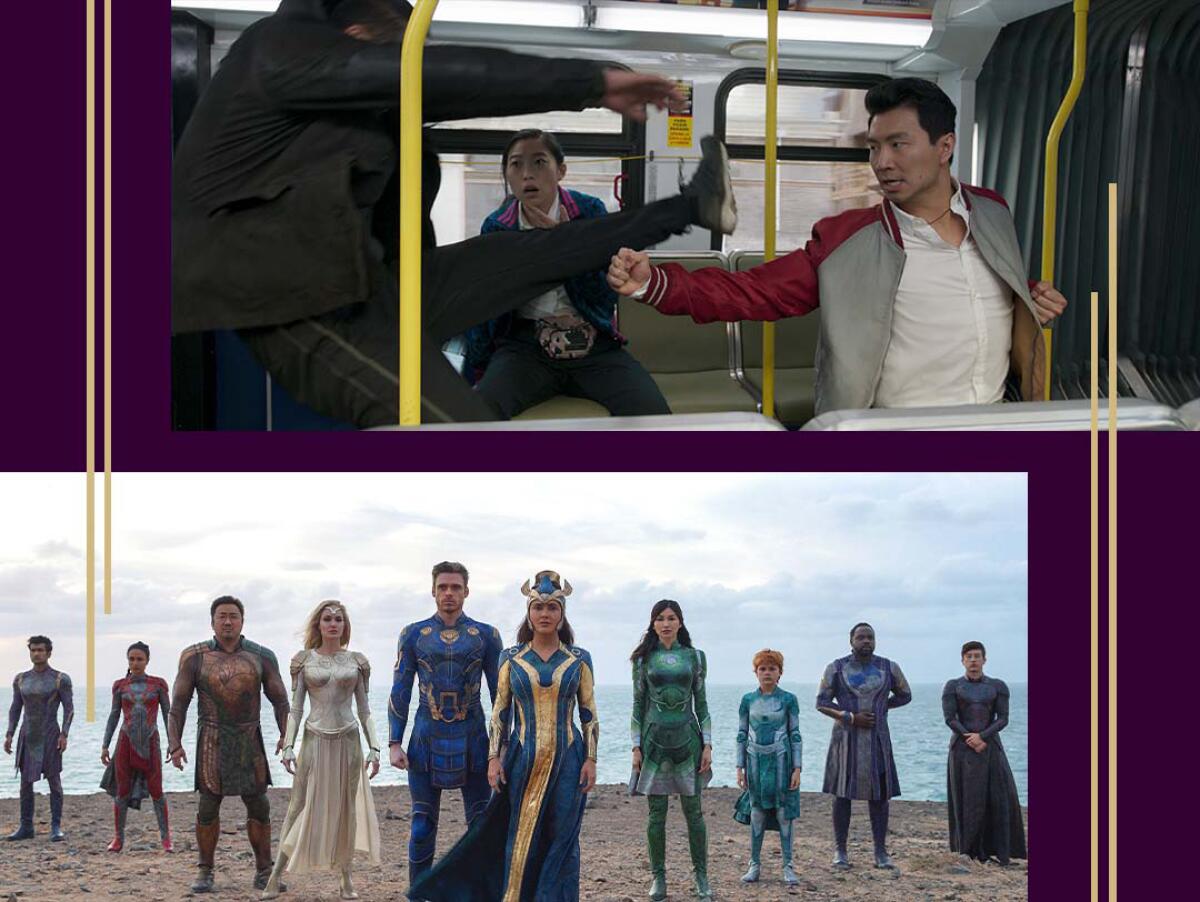
- AMC Theatres unveiled a $25-million marketing campaign with an ad starring Nicole Kidman. It’s highly unusual to see full-blown TV spots for a theater chain, as the big-screen companies have largely relied on studios to market the movies themselves to get butts in seats. Not this time.
- Universal Pictures’ new “Halloween” sequel is going to Peacock on Oct. 15, the same day as its theatrical release. That was the latest indication that theaters are still in for a rough ride as studios make release decisions on a case-by-case basis.
- But that news was offset by Disney’s announcement that, following the success of “Shang-Chi,” it will release the remainder of its 2021 movies, including Marvel “Eternals,” exclusively in theaters. The animated “Encanto” will get a 30-day theatrical window before going to Disney+. Other films will be only-in-cinemas for 45 days.
- ViacomCBS will hand the reins of Paramount Pictures to Nickelodeon chief Brian Robbins, which many interpret as a sign that the storied studio will make streaming films more of a priority. ViacomCBS confirmed the transition Monday, noting that Robbins will take over immediately as president and CEO.
- Conclusion: When covering theatrical distribution, get used to whiplash.
More stories from the week
— Celeb gossip purveyor TMZ joins the Murdoch empire. (LAT)
— David Simon in the New York Times: The question Michael K. Williams asked me before every season of ‘The Wire.’ (NYT)
— China-Hollywood double feature! The Atlantic on how the studios sold out. South China Morning Post on how 2012’s time-travel thriller “Looper” rewrote the future of Chinese-American co-productions.
— The RIAA’s latest report on music industry sales. Key numbers: Recorded music revenues in the U.S. grew 27% in the first half of 2021 over 2020. Streaming accounted for 84% of all revenues. (Variety)
— Apple, a streaming punchline no more? Like the tirelessly optimistic Ted Lasso, people are starting to believe. (The Information)
Final shot...
Portions of this newsletter were written to the blaring punk rock of Baltimore band Turnstile, whose newest album “Glow On” is riff-heavy and super catchy. I know, I know. I’m supposed to care about the new Kacey Musgraves record (and I do, very much). But this was the audio energy boost I needed during the past week.
Inside the business of entertainment
The Wide Shot brings you news, analysis and insights on everything from streaming wars to production — and what it all means for the future.
You may occasionally receive promotional content from the Los Angeles Times.




